The Preacher’s Ex-Wife Who Fooled Hollywood
Nicole Parke styled herself as a billionaire benefactor. Now, a wave of lawsuits casts her as a master of deception, Marie Claire exclusively reports.
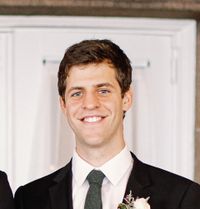
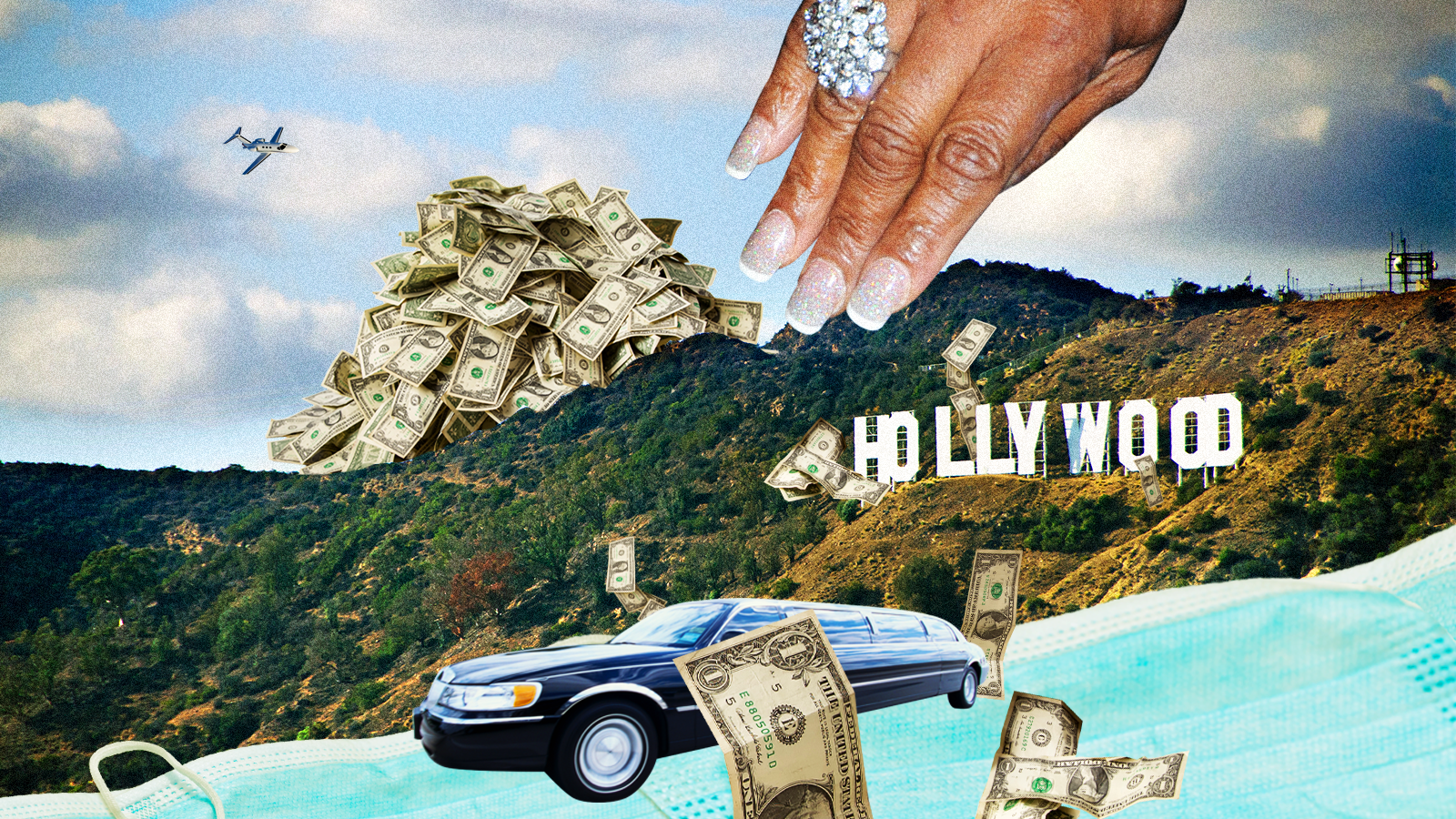
Select the newsletters you’d like to receive. Then, add your email to sign up.
You are now subscribed
Your newsletter sign-up was successful
Want to add more newsletters?

Delivered daily
Marie Claire Daily
Get exclusive access to fashion and beauty trends, hot-off-the-press celebrity news, and more.

Sent weekly on Saturday
Marie Claire Self Checkout
Exclusive access to expert shopping and styling advice from Nikki Ogunnaike, Marie Claire's editor-in-chief.

Once a week
Maire Claire Face Forward
Insider tips and recommendations for skin, hair, makeup, nails and more from Hannah Baxter, Marie Claire's beauty director.

Once a week
Livingetc
Your shortcut to the now and the next in contemporary home decoration, from designing a fashion-forward kitchen to decoding color schemes, and the latest interiors trends.

Delivered Daily
Homes & Gardens
The ultimate interior design resource from the world's leading experts - discover inspiring decorating ideas, color scheming know-how, garden inspiration and shopping expertise.
As wildfires devoured Los Angeles this winter, one woman emerged with a plan to lift the city from the ashes. Nicole A. Parke, a self-proclaimed billionaire philanthropist, wrote a letter to Mayor Karen Bass offering to “deploy” a $100 million disaster relief effort for affected Angelenos. She summoned a publicist, sought out deep-pocketed partners, and spoke with the easy authority of someone used to commanding rooms—and capital.
Parke claimed to run a $50 billion investment fund and a medical supplies company with deep federal ties. Since arriving in L.A. a few years prior, she had rubbed shoulders with celebrities like Akon, Blac Chyna, and Lakers legend Derek Fisher. On Instagram, she posed with the president of Costa Rica and Kim Kardashian—who visited Parke at her offices last year.
Parke’s feed painted a portrait of rarefied wealth, and luxury brands took notice: Bulgari and Cartier allegedly invited her to VIP events; Rolls-Royce feted her at an intimate dinner (the chef served vegan soul food). In person, she wore crown-like braids and crisp Chanel blouses, and she spoke in a vaguely British accent.
Parke’s palatial offices in Burbank completed the picture. They were lined with white marble and anchored by a five-tier chandelier. There was a floor-to-ceiling humidor, a cavernous personal garage, and a figurine depicting a private jet—what she claimed was her preferred mode of travel.
There was just one problem: Nicole Parke did not appear to have $100 million. Or a $50 billion portfolio. Or, apparently, even the money for the jets, jewelry, or luxury cars she flaunted. Marie Claire found just $585 in federal contracts under her company’s name.
Interviews with 12 former associates tell a strikingly similar story: Nicole Parke wasn’t a billionaire—she just knew how to look like one. The illusion was persuasive enough to attract celebrities, government officials, and seasoned investors. According to those who knew her, Parke mirrored their ambition, their longing to belong, their hunger for a shortcut. She understood what success was supposed to look like—and sold that image to people eager to buy in.
The fallout was devastating. Parke, 53, allegedly left a trail of drained bank accounts and ruined friendships across the country: a close friend, a doctor, a landlord, an assistant, a 10-year-old girl, among others. A group of investors claimed she helped defraud them out of $650,000; a five-star hotel alleged she skipped out on a nearly $54,000 bill. Victims say they were collectively duped out of millions. (Parke has denied all claims of wrongdoing.)
Get exclusive access to fashion and beauty trends, hot-off-the-press celebrity news, and more.
Parke and her companies have been named in at least ten lawsuits, with accusations ranging from fraud and unjust enrichment to emotional distress. In one suit filed in July, her former assistant JeVonne Cortez alleged that Parke, her son Enoch, and their associates ran “a Ponzi-style fraud.” (Enoch did not offer responses to numerous factchecking questions.)
According to Cortez, the mother and son duo lured victims with fake identities, falsified contracts, and elaborate lies. Multiple cases have already resulted in default judgments. Others remain active.
Parke’s victims say their lives have been upended. Hers has only grown more lavish.
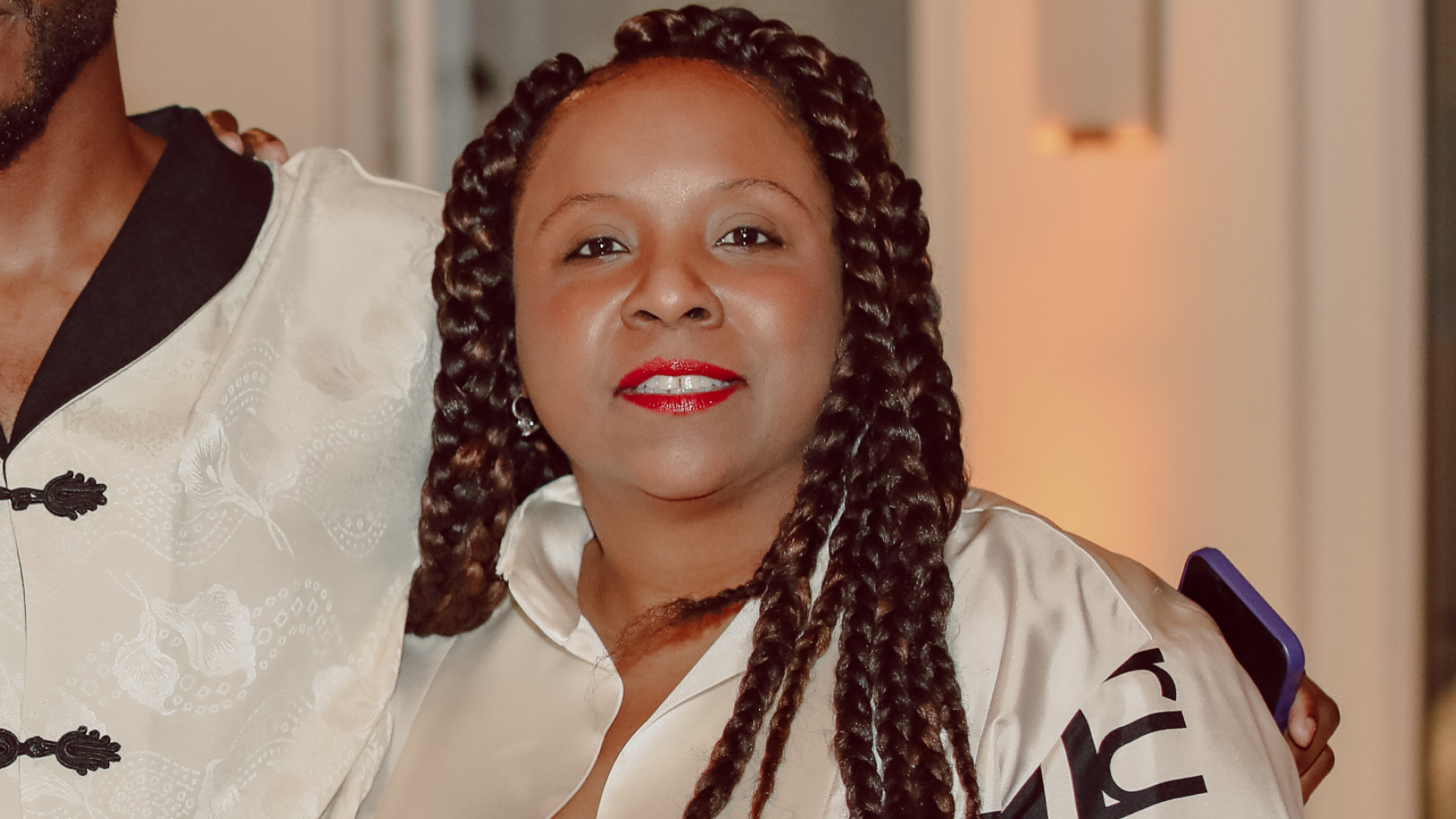
Nicole Parke at an event in Burbank, California, September 2021.
Long before she styled herself as a billionaire philanthropist, Nicole Parke was known as the pastor’s wife at a small church in Queens, New York.
Seated across from a truck yard, the Universal Calvary Church is a steel blue building with the words “Miracle Center” emblazoned along its side in bold white letters. Its founding pastor, Emmanuel Osei-Acheampong, was a towering presence in the community. And to an unusual degree. Some congregants referred to him as “Dad” or “Daddy.”
Mignonette Walters, 73, whose late husband was a member of the church, said Parke “was admired by a lot of people” and was a gifted member of the choir. Although Parke has described herself to many people as Osei-Acheampong’s former wife, Walters recalled that their marriage was eventually nullified after it emerged that their officiant wasn’t licensed. She added that the pastor then married the church secretary, Elizabeth, who became known as the “prophetess.” (Walters said her husband left the congregation decades ago after growing wary of Osei-Acheampong’s behavior.)
Another ex-member, Horace Gordon, accused the pastor of dabbling in “witchcraft.” (The current pastor of the church, Osei-Acheampong’s son from another marriage, Anthony, said that Gordon has that backwards. The church’s membership is globally diverse, he explained. “People come from the islands that are being chased by voodoo, witches, and all these things. And our god and our church deliver them from that.”)
Parke’s path to the church was turbulent, she would later tell friends. Her mom fled an abusive marriage in Trinidad, leaving the children alone with their father. She moved to New York, where Parke later joined her.
Osei-Acheampong took a circuitous route to New York, too. He was born in Ghana, studied veterinary and human medicine in Kenya, and eventually landed in America, where he established U.C.C. Together, Parke and Osei-Acheampong had three sons, including their eldest, Enoch, who was born in 1994. He played drums and guitar in church and dreamed of becoming a professional basketball player, but he didn’t have the height, so he turned his attention to music instead.
By 2009, Parke had separated from Osei-Acheampong, and she was struggling financially. That March, she filed for bankruptcy in New York, telling the court she had between $50,001 and $100,000 in liabilities. She submitted pay stubs showing that she worked at a pediatrics office, where she earned $14 per hour. Meanwhile, her landlord in Queens successfully filed a motion to evict her. (Parke’s bankruptcy petition was dismissed after she failed to submit a copy of her federal tax return and other documents.)
Parke later moved with her sons to Pocono Pines, Pennsylvania. She claimed to people that she had been abused during her marriage and had started working as a nurse. (No one with her name has been registered to work as a nurse in New York or Pennsylvania. As for the abuse claims, Anthony Osei-Acheampong denied that his father was capable of violence, though he wasn’t present for Parke and Osei-Acheampong’s marriage. “People have stories and they make up things all the time,” he said.)
Settled in Pennsylvania, Parke and her boys lived a remote, quiet life—a fresh start far from the preacher—until Enoch began gaining traction as a music producer. By 2015, he was ascendant. That August, he scored a coveted interview on Power 105.1, one of New York’s hottest hip-hop stations. He was there to promote his production company, Excel Over Adversity—or E.O.A. for short. The name was a nod to his initials, but also a declaration of intent.
“I speak things into existence,” he told the host. “I’m not happy to be here. I’m meant to be here.” Parke stood proudly behind him.
A few years later, the family relocated to Los Angeles to help Enoch chase his dreams, and he soon signed a deal with Black Star Music. He began collaborating with industry names, including Justin Bieber’s longtime producer Poo Bear. He hadn’t yet blown up, but it was a start.
Parke kept their three-bedroom home in Pocono Pines, at a cost of $1,800 per month, and she continued spending time there. But according to a lawsuit later filed by the landlord, she allegedly stopped paying the rent. The homeowner created a payment plan for her, which she then allegedly defaulted on, too. By the time the case reached court, Parke had racked up a $72,400 balance. The owner lost the house to foreclosure in 2019.
Life in L.A. wasn’t glamorous. Parke and the kids took up residence in a two-bedroom apartment in Northridge, 25 miles northwest of downtown. It was certainly not Bel Air. But what she lacked in status, she made up for in charm.
JeVonne Cortez met Parke by chance on a corner of Ventura Boulevard in 2019. She had just moved to L.A. from New York and was struck by the sight of a Black woman and her son in that part of town.
Cortez walked right up to them. “Hey, I don’t see many Black people around here,” she said. “Who are you?”
It was the start of a friendship that would eventually implode in court, but in the beginning, it felt like fate. Cortez was a film producer. Parke said her son made music. They quickly fell into each other’s orbit. Parke hosted Cortez in her modest apartment, where she cooked vegan lasagna from scratch.
“Enoch,” Parke said to her son in her Trinidadian accent, “this is your new auntie.”
Then the pandemic hit, and the friendship was put on ice. As Cortez hibernated at home, she followed Parke’s life on Instagram. And then, something strange happened. While COVID lockdowns stretched on, Parke transformed from single mom to socialite, and she began posting increasingly luxurious content: private jets, cigars, trips to Vegas. Cortez was astonished. “We just always assumed that [Enoch] did well in music,” she said.
In fact, Parke had begun rebranding as an entrepreneurial tycoon. Her background was too murky for people in L.A. to question—and the chaos of COVID provided additional cover. By the time Cortez realized something seemed off, she and her children had already lost tens of thousands of dollars, they claimed.
And they weren’t alone: more than a dozen others claimed they got pulled in, too—some with much more to lose.

When the pandemic hit in 2020, most people went into lockdown. Nicole Parke went into business.
The boom in personal protective equipment—PPE—unleashed an unregulated frenzy. Gloves and masks became a kind of global currency, and Parke seemingly saw an opportunity to change her family’s trajectory. Under normal circumstances, an average woman with few apparent credentials would be unlikely to broker massive healthcare deals. During COVID, that was no longer true.
Parke and Enoch jumped into the PPE supply chain, claiming they could facilitate huge transactions between manufacturers and buyers like hospitals, government agencies, and private businesses. Together, they operated under the banner of Excel Over Adversity—Parke as the founder and chairwoman, Enoch as vice chair.
JJ Goldsbury, a fellow PPE entrepreneur, met the duo at their Burbank offices during this time, following an introduction from a mutual contact. He was struck by their charisma—and their faith. “Nikki and Enoch are professed Christians, and me and my partner are professed Christians,” he said. During a gold rush, it helps to have God on your side. “It was the craziest season of my life,” Goldsbury recalled. “Imagine War Dogs, but for healthcare equipment.”
The mother-son team impressed Goldsbury. Parke was a master networker, and Enoch had undeniable gravitas. “He's a young guy, but dude, he carries himself like a king,” Goldsbury said. Parke later told friends that Enoch’s music industry contacts gave the pair a natural starting point as they searched for buyers. Still, Goldsbury said he never saw them close a deal.
Some of Goldsbury’s potential transactions amounted to hundreds of millions of dollars or more, life-changing sums that would have earned him an eight- or nine-figure payday, he said. The allure of that cash was intoxicating.
Parke knew that—and she allegedly used those heady numbers to draw more and more people into her web.
In early 2021, Parke walked into One876, a Caribbean restaurant in Los Angeles known for its beef patties and oxtail. She was warm and personable, recalled the owner, a Jamaican-born former model named Trudy Gray. Gray instantly connected with Parke over their shared Caribbean roots. Before long, Parke was calling her “sister.”
A few months later, Parke invited Gray to an event she hosted at her Burbank offices to promote a film about comedian and activist Dick Gregory. The guest list included The Boys actor Jessie T. Usher Jr.; former NBA player Cuttino Mobley; Zendaya’s father, Kazembe Ajamu Coleman; and entertainment industry bigshots. Parke wore her hair in long braids that spilled over a black-and-white Chanel button-up. An oversized ring sparkled on her right hand. Everything about the look projected quiet royalty.
Gray brought along her husband, Wendell McFarlane, who was struck by the opulence of the office. Parke seemed like the real deal.
More than a year later, McFarlane told Parke he planned to launch a trucking business with his daughter. Parke allegedly offered an alternative: she already owned a trucking company as part of her PPE distribution empire, she said, and suggested he invest the cash with her instead. Parke said her director of finance, Ari Rosenthal, whom she allegedly referred to as her “Jewish attorney,” was on hand to help with any issues.
McFarlane gave Parke $200,000. Not long after, she encouraged him to invest another $1 million, promising she’d match the contribution as a favor between friends, according to Gray. When McFarlane said he didn’t have that much capital, she allegedly floated another option: mortgage their house. That was a line he wouldn’t cross.
Still, Gray felt good about her relationship with Parke. Whenever she stopped by the Burbank office, Parke and Enoch were constantly on the phone, and it seemed like they were closing giant deals. Celebrities flowed in and out, too. The duo “always wanted to take pictures with them,” Gray said. The photos gave E.O.A. an air of credibility. (None of the celebrities mentioned in this story were willing to comment on the record about their interactions with Parke.)
To the casual observer, like Gray, Parke’s operations looked authentic. How else could she have afforded to work out of such lavish offices? That question remains a mystery. Marie Claire asked every source in this story whether they knew of a single transaction E.O.A. closed. No one could offer an example. Parke’s landlord in Los Angeles also declined to explain whether he had cut her a special deal.
Nevertheless, despite E.O.A.’s public image, by 2021, cracks were starting to show. That March, a group of investors wired $650,000 to E.O.A. as a deposit for 1.7 million boxes of gloves, according to a lawsuit later filed in California. But after the money arrived, Parke told them the gloves weren’t FDA-approved as promised, the complaint alleged. Instead, she offered them unapproved gloves at prices way above market.
Parke allegedly claimed she would return the funds, and she sent confirmation that $50,000 had been wired back, the lawsuit said. That money allegedly never arrived either. According to the complaint, she used part of the cash as a down payment on two luxury homes in Porter Ranch, CA. (In a court filing, Parke’s lawyer claimed E.O.A. had gloves sitting in a warehouse and ready to send, but that the plaintiffs had rejected the product without seeing it. The case resulted in a default judgment against Parke and her co-defendants in 2023.)
Gray and her husband were none the wiser. “The only thing that was in the back of my mind,” she said, “was why every time I came to the office, it was just [Parke and Enoch] in there.”
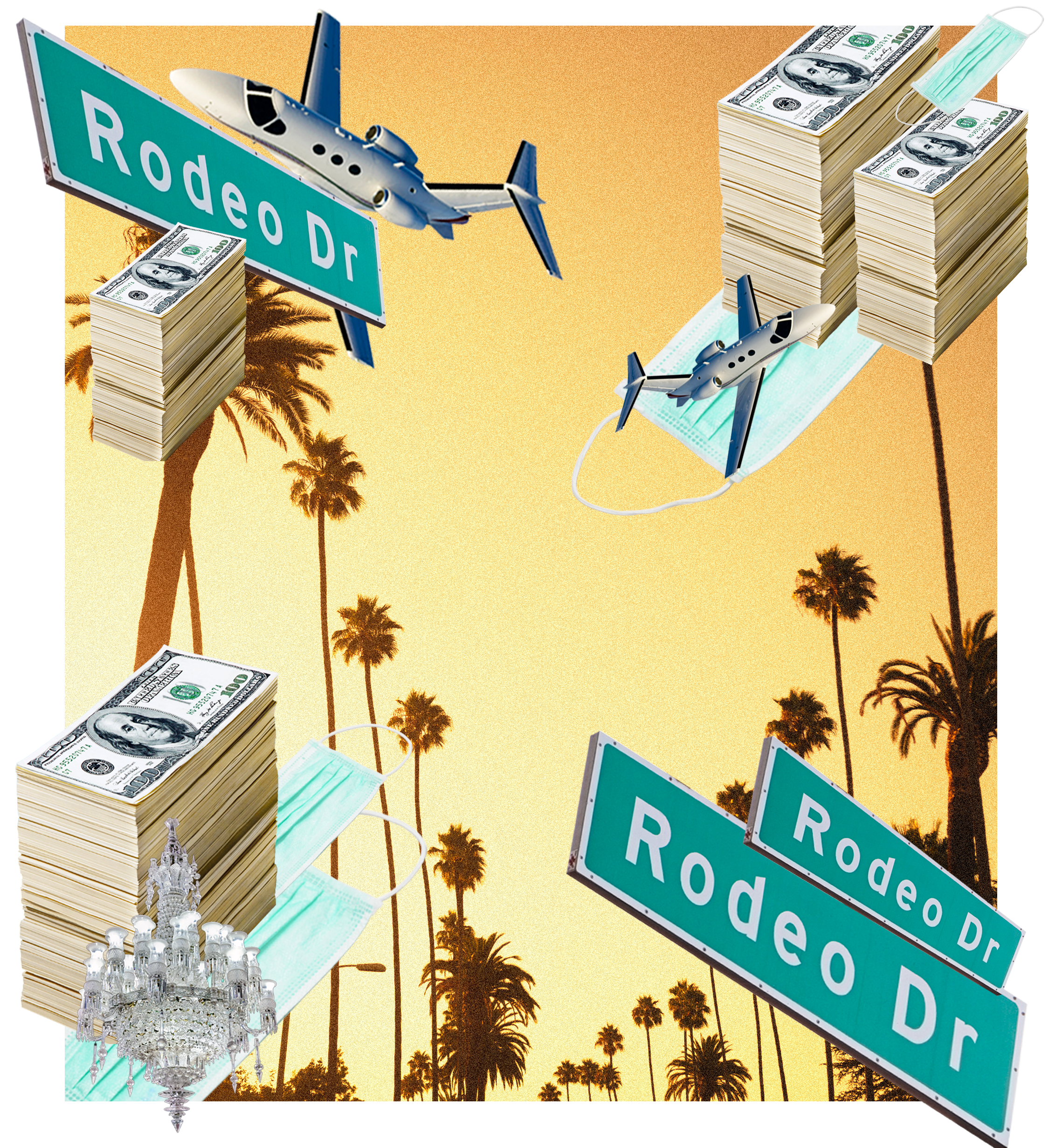
Behind the scenes, the gulf between Parke’s public and private life continued to grow.
In September 2022, Parke quietly filed for bankruptcy in Pennsylvania. She told the court she had between $50,001 and $100,000 in assets and liabilities of $100,001 to $500,000, but the petition was ultimately dismissed for insufficient documentation.
The following spring, she checked into The Dorchester—a storied five-star hotel in London—where she and her entourage reserved three suites for four nights. According to a lawsuit filed by the hotel, they indulged in spa treatments, roughly $14,000 in chauffeured cars, $1,200 in room service, $4,000 in Cantonese food, and $700 in flowers. Then she left—without settling nearly $54,000 of her bill.
Parke didn’t contest the allegations. “I don’t see why I should expend capital to defend myself against a frivolous lawsuit,” she told Marie Claire, referring to multiple default judgments issued against her. Later, she claimed that certain “individual(s)” mentioned in this story tried to perpetrate a fraud against her company, but she did not reply to an email asking for evidence or additional information.
For Parke and Enoch, this kind of extravagance was business as usual. It was a virtuous cycle: The more the duo flaunted wealth, the more money flowed in. And the more money they received, the more lavish their lifestyles became.
When Cortez reconnected with Parke in 2023, Parke explained her newfound affluence in simple terms. She had secured PPE orders worth tens of millions of dollars per month and owned 100 percent of her supply chain—including five cargo ships outfitted with 121 temperature-controlled containers—according to a lawsuit Cortez later filed against Parke and Enoch. (The case is still pending.) They allegedly bolstered their story by showing her “fraudulent pledge forms, contracts, and letters of decree purporting large transactions.”
Parke and Enoch also claimed that BlackRock managed 25 percent of their “family office,” Cortez alleged. Multiple times, Enoch logged into an online account, and it appeared to show a balance of $500 million, she said.
Cortez was stunned by Parke’s transformation. She no longer spoke with a Trini accent, but with a hushed, subtly British tone—more Duchess of York than downtown L.A. She didn’t go by “Nikki” anymore, either. To almost everyone, including Enoch, she was now “Ms. Parke.”
Cortez couldn’t look away. And then, tantalizingly, Parke asked if she wanted to invest in the business. “I was all in,” she said. “She opened our eyes—not just to a new industry, but a level of life.” Her husband was less sure. So they began with a smaller sum of money. Or, rather, their children did.
“I actually let my 10-year-old daughter, who's an actress and makes her own money, take 6,000 of her dollars” and invest, Cortez said. Her son put in $7,000 of his savings four months later. According to Cortez, Parke said she had only accepted such small amounts of capital because they “were family.”
In August, a judge in L.A. shot down the daughter’s demand for repayment. Cortez submitted a request to the court asking for clarification on why the petition was denied. Her son, however, was granted $7,075.
As of publication, Cortez said he still hadn’t received those funds.

Cortez didn’t just hand over her kids’ cash—she also handed over more than a year of her life.
According to Cortez, Parke offered her enormous commissions if she helped E.O.A. land deals for its supposed PPE products. So she and her husband dropped everything and went to work, attempting to recruit celebrities, colleges, healthcare networks, even representatives of foreign countries like Canada, Peru, and the Saudi royal family, Cortez said. “The numbers were so much larger than where we were in our careers in the film industry,” she recalled.
But even as high-profile connections rolled in, Cortez said, the deals never closed. Each time a potential partner would ask for documentation, the transaction would fall apart, she claimed. (Parke would copy her alleged “Jewish attorney,” Ari Rosenthal, on most emails—though he never showed up to meetings or calls, Cortez recalled.)
It’s not clear what Parke’s motivations were for all of this effort. There appears to be no documentation that she and Enoch closed a single PPE deal, despite years of work. Perhaps they really did believe they would cash in on the gold rush.
Cortez wanted a big payday, too, but she also had a family to feed. Eventually, she told Parke she needed to get a normal, paying job instead of hawking PPE. Parke offered to hire her as an executive assistant, with a salary of $15,000 per month, according to Cortez’s lawsuit. (Parke allegedly promised to pay her quarterly.) The job quickly expanded beyond Cortez’s expectations. “I was serving Enoch. I was a secretary. I was the butler. I was the house manager, the building manager,” she said.
Cortez recalled trailing them through designer showrooms: Hermès, Bulgari, Christofle. At Loro Piana, they sipped Acqua Panna in red velvet chairs while LVMH CEO Bernard Arnault—one of the world’s ten-richest people—smiled behind them. At Tom Ford, Enoch tried to rack up a bill of more than $600,000, Cortez claimed—then failed to follow through on the invoice. (He told Cortez to have the brand contact Ari Rosenthal to sort out the finances.) At times, Parke gave Cortez gifts, too.
Ninety days passed from the start of Cortez’s employment, but her paycheck never arrived, she said. In her lawsuit, she accused Parke and Enoch of “excessive spending” on luxury goods “while my labor and investments went unpaid.”
Cortez’s experience mirrored that of Marissa Sample, another one of Parke’s ex-assistants. Sample, a former hairdresser and newly single mom, had joined the staff in 2022. It was her first corporate job, and Parke allegedly told her the first three months would be an unpaid trial, as was supposedly standard in the white-collar world.
While working for Parke and Enoch, Sample found their behavior strange for purported high rollers. “I used to have to send back a lot of their food at restaurants,” she said. Once, they made her return to Porto’s Bakery because Enoch didn't like the size of the carrots in his sandwich. When she returned, they sent her back once more because they were missing a potato ball, she recalled. “Any time they could find a reason to get money from an establishment or something for free… they would take advantage.”
Sample later quit, alleging that Parke never paid her. She had stuck around only because Parke promised her a cut of one of E.O.A.’s supposed PPE contracts with Saudi Arabia, she said.
“It just makes me cringe to this day that I allowed that,” Sample continued. Still, she said, “I was also desperate.”
Court records and interviews suggest her experience mirrored that of many others sucked into E.O.A.
Muhammad Mansour, a Santa Rosa-based naturopathic doctor, has a roster of elite L.A. clients and a specialty in regenerative therapies, including laser treatments, nerve stimulation, and IV drips. When he met Parke and Enoch in 2024, he was under the impression that they were “very, very wealthy people” who owned a multimillion-dollar medical supplies company.
At their first meeting, the mother and son allegedly asked Mansour to provide free services in exchange for introductions to high-profile potential patients like Justin Bieber and NBA stars Jaylen Brown and Jayson Tatum. Parke even claimed to have ties to the mayor of Los Angeles and the White House, Mansour said. She showed him a photo of herself with Kardashian and a screenshot of an apparent Zoom call with Magic Johnson to prove her access.
“I told them I can’t do that, because it’s illegal. That’s called kickbacks,” he said.
Instead, they offered him a $125,000 retainer, Mansour recalled. He says Parke wrote a check—but told him not to cash it yet. She allegedly promised to pay his invoices promptly; the check was just insurance in case she didn’t follow through. She just needed a little bit of time to prepare the transfer, Mansour recounted her saying. She allegedly attributed the delay to bureaucratic issues caused by her contracts with the federal government.
Months ticked by, and Mansour continued treating Parke and Enoch on credit. Ari Rosenthal sent him a series of emailed excuses for the delays, he said.
As his unpaid bill soared, Mansour got fed up and decided to cash the check. He tried three different bank branches, but the check bounced.
In May, Mansour filed a lawsuit accusing Parke and Enoch of fraud and unjust enrichment. The language in the complaint alleged that Parke’s “intentional misrepresentations and false promises” induced him to provide services without compensation.
And it wasn’t just Parke and her son. It was also Ari Rosenthal, who should have held strict ethics by virtue of his faith and vocation.
Unless he didn’t exist. Mansour traced Rosenthal’s number, but “it came up a bust,” he said. “It was a scam number.” Cortez, who spent endless hours meeting everyone in Parke’s world, never spoke to the man either. Nor did anyone who received his emails: Mansour, Gray, McFarlane, Parke’s realtor, and at least one business E.O.A. owed money.
According to public records, no person named “Ari Rosenthal” is licensed to practice law in California, New York, or Pennsylvania. Marie Claire contacted the phone numbers in Rosenthal’s E.O.A. email signature, but no one picked up. The email account listed in his name is also no longer valid.
In her lawsuit, Cortez was explicit: Ari Rosenthal “is not a real person,” she wrote. Rather, she claimed, he was a fictional character devised to help E.O.A. get out of jams.
Mansour said he fell for Parke and Enoch’s tales because they knew which buttons to press. “They definitely wanted to target the fact [that] I was a minority in a space of doctors that are typically white,” he told Marie Claire. For a while, the message resonated.
“That’s one of the biggest things that Nicole sees in people…. What will get them to tick, what will get them to be on our team,” he said. “They’re very good at finding that Achilles’ heel, whatever it is. And they’ll just sing it. They’ll just sing it from the highest mountaintop.”
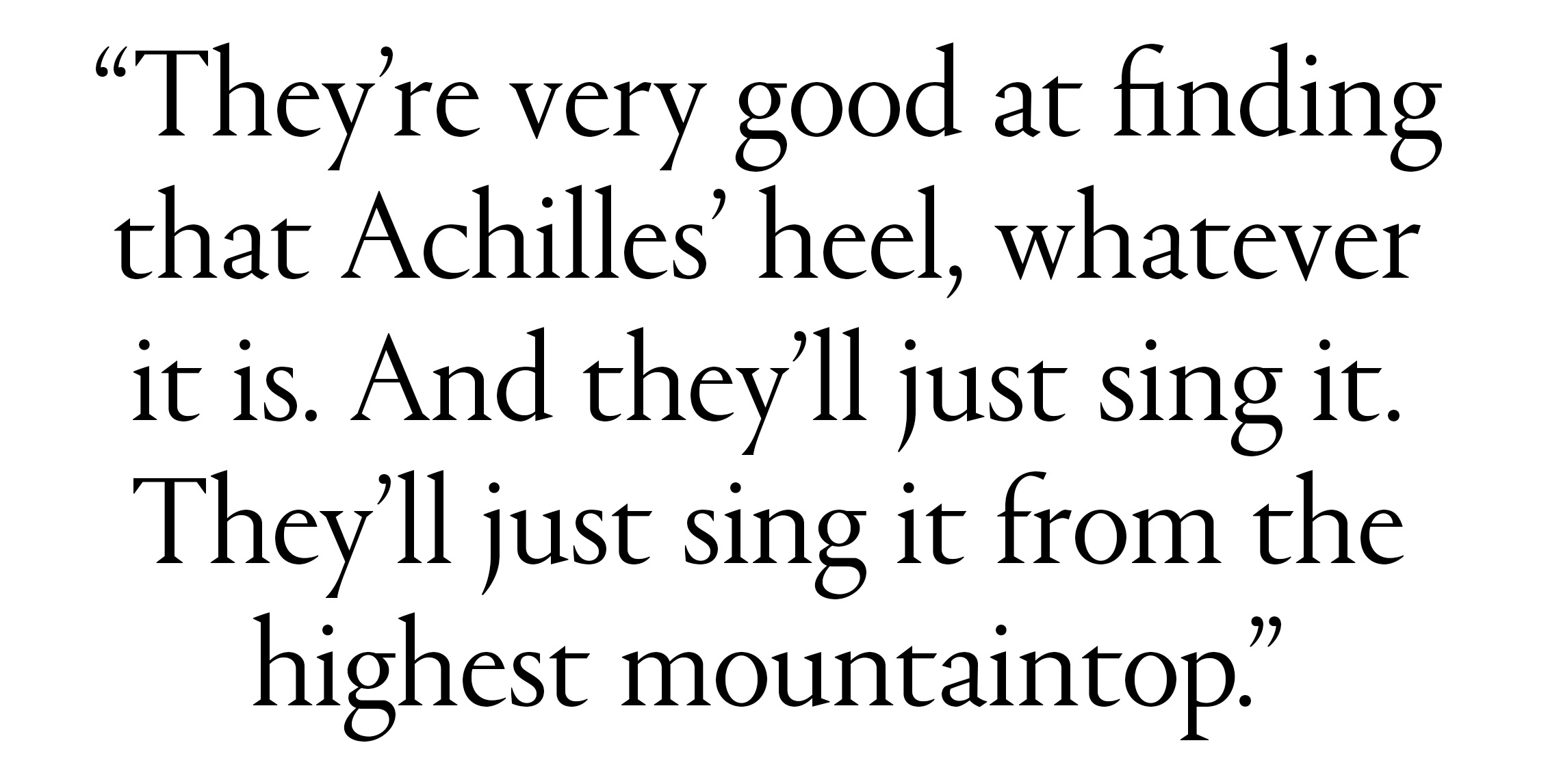
This year, yet another prominent figure walked into E.O.A.’s Burbank offices: Major General John F. Wharton, who had entered the private sector after retiring from the U.S. Army. Wharton told Marie Claire he was there to suss out the company on behalf of some friends, who were contemplating a deal involving nitrile gloves.
“Nicole and her son were very kind, cordial, and wonderful as people,” he said.
There came a point when E.O.A. was asked to write a partnership agreement, but Parke balked at paying for lawyers, the general said. For Wharton’s partners, that “was a little bit of a red flag,” considering how large of a company she claimed to be operating. The deal never went anywhere. But Parke still snagged a photo with her guest.
“SLAM DUNK!!!!” she texted one of her associates, alongside the image.
This was a familiar pattern. As with other celebrities, the photo was a victory itself, even though a business agreement never materialized. Parke used the same move last year on Kim Kardashian after she visited Burbank for a meeting.
Come January, the L.A. wildfires presented yet another opportunity for Parke to step into the spotlight. As flames engulfed the city, Parke devised her $100 million initiative.
She contacted Mansour—despite owing him tens of thousands of dollars—and allegedly asked if he wanted to participate. She told him she had already secured at least $75 million in commitments, he said. He declined to get involved. “I realized that [it] was just a ruse and a way of playing on people’s emotions during a time of crisis,” Mansour said.
According to Cortez, Mansour’s instincts were correct. “We can help rebuild L.A., and then we'll have access to whatever relationships that we want because we did a good deed for the city,” she recalled of Parke’s thinking.
Parke even hired a publicist, Erica Dumas, to help her go public with the plans. It was a chance to make herself a brand name in L.A., and perhaps land investments from ultra-rich benefactors. The details on how to follow through on such a massive pledge could apparently be sorted out later.
When Dumas arrived at their first meeting, Parke and Enoch were receiving IV drips, she said, “which seemed very unprofessional and odd.” Dumas recalled asking basic questions about where the $100 million was coming from, yet she didn’t receive clear answers.
“I immediately sensed something wasn’t right,” she said. The press release never went out.
Reached for comment about the debacle, a spokesperson for the mayor acknowledged that a member of the mayor’s staff joined one meeting regarding Parke’s plan after receiving a disaster relief proposal submitted on her behalf. He insisted, however, that the mayor’s office "had no involvement in the initiative you are referencing.”

By summer, the lawsuits had stacked up: Cortez. Cortez’s children. Mansour. Parke’s landlord. A marketing firm hired for the Dick Gregory film. Parke’s former realtor, Claudia Ilcken, sued her and Enoch, too, alleging they swindled her into investing $25,000 into E.O.A. by showing her fake contracts with Ghana and Qatar. In her complaint, Ilcken accused them of fraud and “predatory” behavior.
For some, the fallout was both personal and financial. Ilcken had bonded with Parke over their shared immigrant backgrounds and experiences as single mothers. “I just felt proud of her,” she said. Parke allegedly knew that Ilcken’s mom had recently undergone cancer treatment, so she brought Ilcken to the Burbank offices and showed her samples of gloves supposedly used for chemotherapy. Parke even sent her bible verses. The overtures moved Ilcken profoundly.
When Ilcken realized she had been duped, she was crushed. “It was hard for me to get out of bed,” she said, breaking down in tears. “I felt so stupid.”
Ilcken said she went to the Burbank Police, the Securities & Exchange Commission, the FBI, and the California Attorney General’s office to report Parke, but she said nothing came of it.
Gray was left equally wrecked. When her father died last year, she didn’t have the money to pay for his funeral, she said. “All this put a strain on my marriage,” she added. She and McFarlane are now living apart.
In the meantime, Parke went on offense. In March, her real attorney, Matthew L. Morris, sent a cease and desist to Cortez, accusing her of making “false and disparaging statements.” He sent a similar letter to McFarlane and Gray. (Morris told Marie Claire he “issued a cease-and-desist letter to certain individuals who were circulating demonstrably false claims.” He did not respond to an email asking him to elaborate on what those claims were, nor did he confirm whether he still represents Parke and Enoch; he told Marie Claire, “I don't have any greater contact with them than you do.”)
When Marie Claire reached out to Parke to ask about these mounting accusations, she answered the call with a chilly composure—and the same inexplicable British accent.
“You have the audacity to pick up the phone to call me and ask about my company,” she said. “Whichever witch hunt this is, they will not succeed.” She declined to answer specific questions, though she invited the reporter to visit her in person—only to revoke the offer hours later as the reporter was entering airport security.
Still, she remained defiant. “One thing you will learn about me,” she said, “I will always be true to who I am.”
It would be easy to cast Parke as a manipulator or a mastermind. But some former associates see a simple playbook—one where appearance, in certain circles, can be as powerful as proof. In Los Angeles, the right image—the clothes, the confidence, the company you keep—can go a long way before anyone asks hard questions.
Maybe Parke even started believing her own stories. Self-delusion can be a potent drug. After a while, said JJ Goldsbury, the PPE entrepreneur who once admired her, “it’s easy to get caught up in it.”
And apparently not easy to quit. This winter, as E.O.A.’s enemies were multiplying, Enoch reached out to Goldsbury again. He said he was working on something new—and that he needed a favor.
A small loan. Just $10 million.
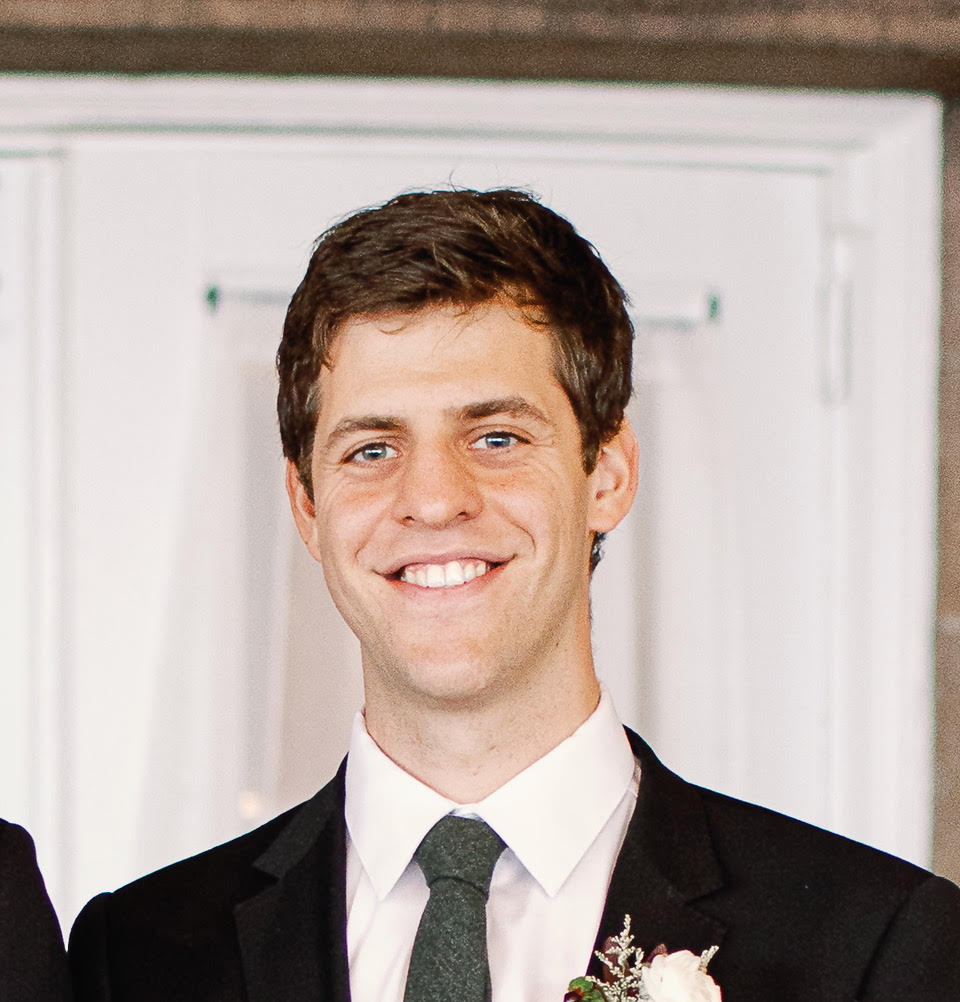
Noah Kirsch is a freelance reporter specializing in long-form features and investigations, particularly at the nexus of wealth and power. Previously, he was a senior reporter at The Daily Beast. Before that, he was a staff writer at Forbes Magazine.